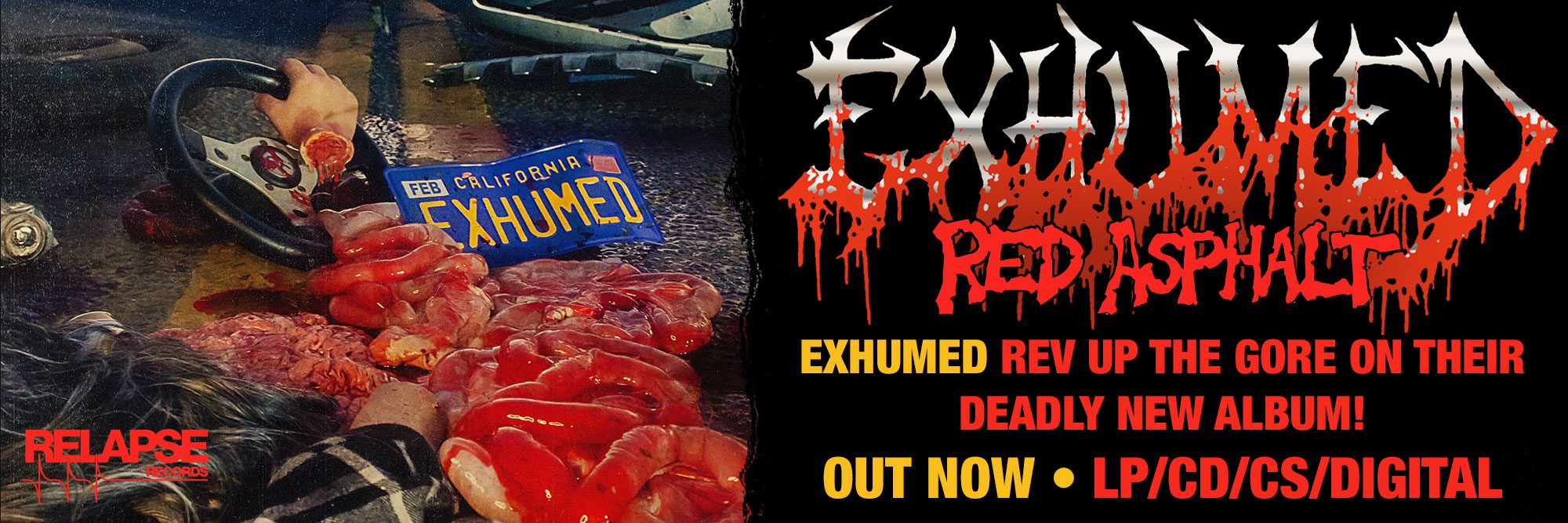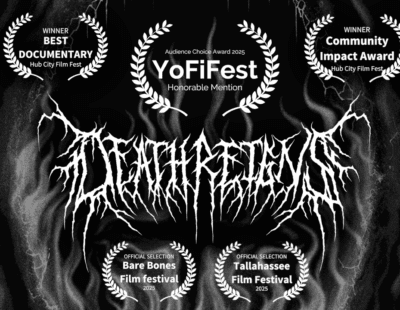
Some of the coolest music you will ever encounter is made by artists whose perspective is so removed from what constitutes “normal” that it sounds made by extraterrestrial beings that are trying to replicate human music, and are not quite getting it right. The musical landscape is littered with such outsiders, many of whom are so ahead of their time that it takes decades for the rest of the world to catch up and realize the originality and prescience that work has: Karlheinz Stockhausen, Can, The Velvet Underground, Kraftwerk, Van Der Graaf Generator, Einstürzende Neubauten, and My Bloody Valentine are such artists whose influence looms very large, decades after their music first was performed.
Heavy metal embraces that outsider status, it’s its own Island of Misfit Toys in a way, but for the past 40 years, the one band that stands out as outsiders among innumerable outliers is Quebec’s own beloved sons, Voivod. Filmmaker Felipe Belalcazar, director of the acclaimed 2016 documentary Death by Metal, took it upon himself to assemble the definitive cinematic tribute to the ultimate progressive metal weirdos, and after many years and a couple kickstarter campaigns, Voivod: We Are Connected received its world premiere on Monday, July 29, fittingly, at the Fantasia International Film Festival in Montreal, one of the largest genre film fests in the world. With the band in attendance, given several standing ovations (returning heroes that they are) by an adoring audience of hundreds, Belalcazar’s film went over huge thanks to his palpable love of the band, which translates to the screen extremely well.
With the full participation of the band, save Jean-Yves “Blacky” Theriault (whither Blacky?!), and featuring insightful commentary from musicians, writers, scholars, family, and friends, Voivod: We Are Connected exudes the same kind of warmth that the band itself has shown for all these years. As it’s put very early on, it’s next to impossible to explain the exact appeal of Voivod’s unique hybrid of NWOBHM, krautrock, thrash metal, ‘70s prog, anarcho-punk, industrial, and science fiction. Minute by minute, though, the two-and-a-half-hour film peels back layer after layer of the onion, delving into the band’s origins, their musical influences, their own music, all the tragedies and triumphs over their career, and near the end, like cet oignon métaphorique, you’re fighting back tears.
The tales of Voivod’s teenaged adventures in the remote Northern town of Jonquière, Quebec are a huge highlight of the film, as drummer/visionary Michel “Away” Langevin and vocalist/lyricist Denis “Snake” Belanger regale Belalcazar with story after hilarious story. The rich details of the recollections are in turn illustrated wonderfully by the director, often incorporating Away’s own artwork to create his own strange little animated alien docudrama. If you ever grew up in a cultural backwater whose primary industry was an obnoxiously loud factory, you’ll understand the band’s sense of isolation, but as is quickly brought to light, that isolation feeds the creative mind of a restless dreamer like Langevin, and Voivod could only come from such a weird vacuum.
No stone goes unturned, either. Unlike other music documentaries where musician commentary yields little more than a cursory “they rule!” statement, the interviews with Voivod’s peers offer very keen, smart perspectives. Belalcazar hits his stride when the film explains the twisted logic behind the groundbreaking guitar work of the late Denis “Piggy” d’Amour, intercutting insight by such luminaries as Tom Warrior, Mikael Akerfeldt, Dan Swano, Tobias Forge, King Fowley, Danko Jones, Jason Newsted, and Ivan Doroschuk. Adding valuable context are some outstanding writers, including Decibel’s own Jeff Wagner and Greg Pratt, and especially the late Laura Wiebe (rest in power, Laura) whose thoughtful, studious analysis grounds the entire movie. For the layperson who might not be familiar with albums like Dimension: Hatröss, Nothingface, and Angel Rat, the way Balalcazar carefully and lucidly walks the viewer through the structure of the guitar work will be the big “light bulb” moment that compels them to seek out the music. Even longtime fans, who might think they know everything there is to know about Voivod, will learn a thing or three.
Of course, a good film needs an arc to engage audiences, and We Are Connected benefits from the band’s own redemptive timeline: the gritty early days in Montreal, recording in Cold War Berlin, their stunning musical growth, the legendary 1990 tour where they headlined above Faith No More and Soundgarden, the departure of Snake and Blacky, the criminally underrated mid-‘90s era with Eric “E-Force” Forrest, the band’s post-2000 resurgence, Piggy’s tragic death, the emergence of two gifted new members, Dan “Chewy” Mongrain and Dominic “Rocky” LaRoche, and ultimately, recognition from within the music industry that was long overdue.
Voivod would not be here today were it not for the contributions of Mongrain over the last 15 years. Already an established lead guitarist with Martyr, he is such a devotee of Voivod and Piggy that he not only could replicate Piggy’s idiosyncratic playing style, but as he proved on 2013’s Target Earth, 2018’s The Wake, and 2022’s Synchro Anarchy, he could add his own ideas to the band’s music and still remain faithful to that very specific sound. The story of Mongrain and LaRoche is a fun little subplot throughout the film, as the two friends grow up massive Voivod fans in their hometown of Trois-Rivières, Quebec, and at one point Balalcazar adds video of a euphoric Mongrain, in the front row at a Voivod show in 1999, headbanging and gesticulating like an adoring disciple. Seeing Voivod’s future guitarist acting like a giddy fanboy, less than a decade before joining his idols, brought the house down. As Snake puts it rather poetically, Voivod’s music planted the seeds, Chewy and Rocky were the young seedlings to Voivod’s tall, mature trees, and when Piggy’s tree fell, Chewy and Rocky’s trees were there to take its place. Like the song says, “we are connected”.
The film’s most heartwarming moment is when the band talks about just how special the two Juno Awards – The Wake and Synchro Anarchy both won Metal/Hard Music Album of the Year – were to all of them. They seem pleasantly surprised by the accolades this late in their career, but as this documentary alludes, Gen-Xers who listened to Voivod as teenagers are now in places of influence and are finally having their say, and proudly won’t shut up about their favorite band. We’re writers, editors, label execs, musicians, awards jurors, broadcasters, programmers, academics, influencers, and filmmakers. The goodwill that Voivod fostered for decades is now being reciprocated tenfold by the very weirdos who grew up on their music, and Voivod: We Are Connected is a much-needed testimony to an enduring, endearing band.






